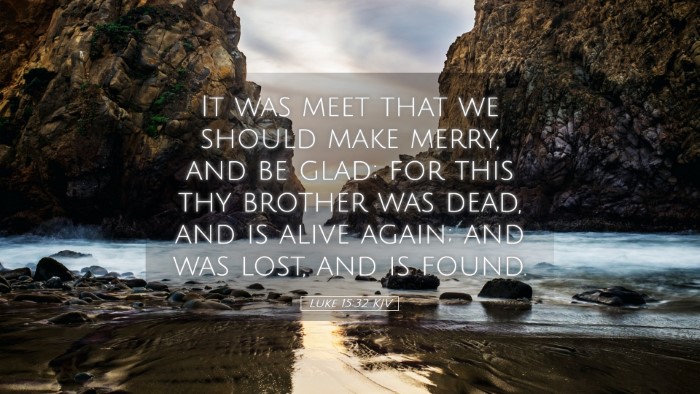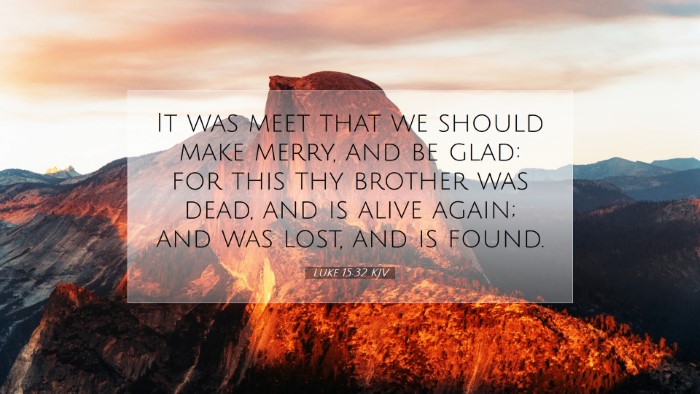Commentary on Luke 15:32
The verse Luke 15:32 states: "It was meet that we should make merry and be glad: for this thy brother was dead, and is alive again; and was lost, and is found."
This pivotal verse comes at the conclusion of the parable of the prodigal son, a narrative that conveys profound truths about grace, repentance, and forgiveness. As the father emphasizes the need for joy and celebration over the return of his lost son, deeper theological implications can be drawn from this celebration of redemption.
Context and Structure
Context: The parable itself reveals a three-part narrative: the demand for inheritance, the reckless living of the younger son, and his subsequent return to the father. The elder brother represents a contrasting response to grace and acceptance.
Theological Insights
1. The Nature of Divine Mercy
Both Matthew Henry and Adam Clarke elucidate that this verse underscores the unconditional nature of the father’s love, mirroring God’s love for humanity. The father's response indicates that God's mercy is not restricted by human standards of justice or behavior.
2. The Joy of Heaven
Albert Barnes points out that the emphasis on joy in this verse reflects the overarching theme of celebration associated with repentance. Jesus frequently illustrates the joy that accompanies salvation (as also noted in Luke 15:7 and 10). This joy indicative of Heaven rejoicing when a sinner repents encapsulates the essence of Christian hope and redemption.
3. Restoration, Not Reprimand
The father could have reprimanded his son for his waywardness; however, he chooses celebration over condemnation. This indicates that God’s primary desire is for restoration rather than punishment. As Matthew Henry suggests, the father’s actions reveal a model of pastoral care that emphasizes acceptance and reconciliation.
4. More than a Lesson on Sin
Adam Clarke articulates that this parable extends beyond merely addressing sin; it also critiques the attitudes of self-righteousness, epitomized by the elder son’s reaction. The father’s insistence on celebration invites the listener—and indeed the elder brother—to confront their own need for grace.
Practical Applications
1. Embracing Restoration in Ministry
Pastors and church leaders are called to embody the father's forgiving spirit. In a world rife with brokenness, emphasizing reconciliation can attract many who feel disenfranchised or unworthy of grace.
2. Cultivating a Culture of Celebration
Communities should create a culture where joy in the presence of repentance is paramount. As noted by Henry, celebrating instances of transformation fosters an environment where individuals feel empowered to seek restoration.
3. Addressing Self-Righteousness
Understanding the attitude of the elder brother allows believers to reflect on their perceptions of grace and forgiveness. It encourages self-examination regarding how they relate to those who fall short. As Barnes encourages, we must resist the temptation to measure grace and instead embrace it fully for ourselves and others.
Conclusion
The theological depth of Luke 15:32 reveals a rich tapestry of grace exemplified through the father's celebration of his son's return. It serves as an admonition against self-righteousness while inviting all to experience the joy that is found in redemption. In light of this passage, it is vital for theologians, students, and pastors alike to foster an understanding and practice of grace that mirrors the Father's heart. As believers, let us make merry and be glad, for those who were once lost can indeed be found.


